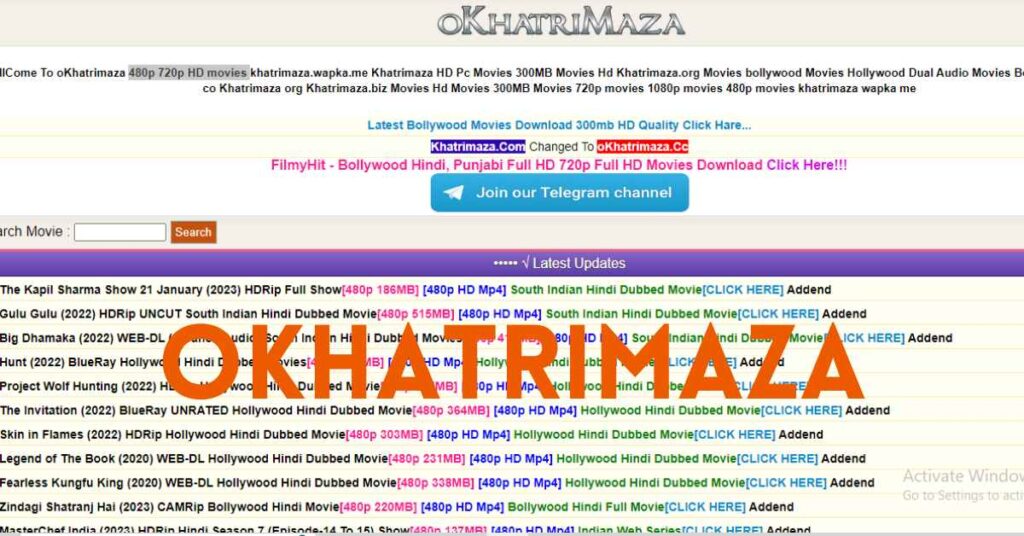Is the allure of instant access to the latest cinematic releases worth the potential risks? The proliferation of websites offering free downloads of Bollywood, Hollywood, and South Indian films, particularly through platforms like Khatrimaza, raises serious questions about copyright infringement, digital security, and the long-term health of the film industry.
The digital landscape has transformed the way we consume media. Gone are the days of waiting for a film's theatrical release or relying on physical copies. Now, a plethora of websites and services promise instant access to movies and television shows, often at no cost. Among these, platforms like Khatrimaza have garnered significant popularity, particularly among movie enthusiasts seeking the latest Bollywood and Hollywood releases, often dubbed in Hindi. These platforms, offering a vast library of content, have become a tempting proposition for viewers worldwide.
Khatrimaza, in its various iterations (including Khatrimazafull, khatrimazafull.net, and khatrimazafull.com), presents itself as a one-stop destination for movie downloads. Users are enticed by the promise of free access to new releases, including 2025 Bollywood films, South Indian cinema, and Hollywood blockbusters. The allure is undeniable: immediate gratification without the financial commitment of purchasing tickets or subscribing to streaming services. The availability of different quality options, including dual audio tracks and various resolutions (from 300mb movies in 480p to 1080p), further caters to the diverse needs and preferences of users. This seemingly convenient service caters to a wide audience, offering content in multiple languages, including Hindi and English, making it accessible to a vast viewership.
However, behind the veneer of free entertainment lies a complex web of legal and ethical considerations. The core business model of Khatrimaza and similar platforms revolves around copyright infringement. By offering copyrighted content without permission from the rights holders, these websites operate in direct violation of intellectual property laws. This illegal distribution has far-reaching consequences, impacting the film industry, content creators, and, ultimately, the consumers who choose to engage with these platforms.
Furthermore, the use of such websites exposes users to a range of digital threats. Websites that host pirated content often contain malware, viruses, and other malicious software designed to steal personal information or compromise device security. Clicking on suspicious links, downloading files from unverified sources, and interacting with intrusive advertisements can all lead to the installation of harmful software, putting users at risk of identity theft, financial fraud, and other cybercrimes. The fast download speeds and lack of registration requirements, which are often touted as advantages, are frequently achieved through practices that compromise user security. The pursuit of free content often comes at the cost of digital safety and privacy.
The focus on free downloads of movies has created a landscape where the rights of content creators are often disregarded. The film industry, a significant contributor to the global economy, invests heavily in producing films. These investments cover everything from script development and pre-production to filming, post-production, marketing, and distribution. When websites like Khatrimaza allow for the free, unauthorized distribution of these films, they directly undermine the industry's ability to recoup its investments. This financial strain can lead to reduced budgets for future projects, decreased opportunities for creative talent, and a decline in the overall quality and diversity of cinematic offerings. The economic impact is not limited to the film studios; it extends to all the professionals involved in filmmaking, from actors and directors to the supporting crew.
Alternative website like Filmibeat, that focuses on Bollywood movies, including actors, actresses, and celebrities. The site provides a platform for the latest news, updates, and reviews of upcoming Bollywood films in 2025, and also offers a list of upcoming movies. While such sites provide valuable information, they are often contrasted with platforms like Khatrimaza, which are a source of controversy.
The success of platforms like Khatrimaza also reflects the evolving viewing habits of modern audiences. The demand for readily available content, the convenience of streaming on various devices, and the desire for a vast selection of movies and shows have all contributed to the shift in consumption patterns. While these factors are driving change in the media landscape, they cannot justify the practice of copyright infringement. There is a crucial need for platforms to satisfy the demand while respecting creators' rights.
Considering the risks and consequences, it's imperative to explore safe, legal alternatives for streaming movies and TV shows. Numerous legitimate platforms offer a wide variety of content at affordable prices. These include major streaming services like Netflix, Amazon Prime Video, and Disney+, as well as other services that provide access to a diverse range of movies and shows. Supporting these platforms is a way to enjoy content while respecting copyright laws and protecting your digital security.
The film industry, like all creative industries, thrives on innovation and the contributions of talented individuals. But the creative process relies on financial support. The rise of illegal downloading platforms threatens this crucial funding. The industry needs to protect its rights and create a sustainable future.
There is a clear message that needs to be understood: downloading from piracy websites involves breaking the law, and it can carry consequences. These might include fines, legal action, and penalties. More importantly, such websites can be a gateway to a host of digital threats. It is essential to understand the legal and ethical implications, and to make informed decisions about where to access content.
The allure of Khatrimaza, with its wide selection of movies and lack of financial commitment, is clear. However, a discerning viewer should weigh the supposed gains against the risks. These risks include malware threats, legal challenges, and the negative effect of undermining content creation.
Film viewers should also explore the opportunities that are available through legal streaming options. These platforms have a wide choice of content. They also provide assurance that rights are respected and also protection from the dangers that can be found on pirated websites.
The rise of Khatrimaza mirrors a changing digital landscape, in which technology gives users the power to access content from anywhere. The choice to support copyright or to take part in illegal acts is a choice that each individual must make. It requires a responsible and informed way of consuming media. The future of the film industry is built on that kind of decision, one that values creativity, recognizes ethics, and favors digital safety.
Here is a table offering a comparative analysis of legal streaming services versus piracy websites like Khatrimaza:
| Feature | Legal Streaming Services | Piracy Websites (e.g., Khatrimaza) |
|---|---|---|
| Legality | Compliant with copyright laws | Violation of copyright laws |
| Cost | Subscription fees, rental/purchase options | Typically free |
| Content Availability | Vast libraries, with new content added regularly. Limited availability of some titles depending on licensing agreements. | Often features latest releases, but content may be incomplete, poor quality, or missing. |
| User Experience | User-friendly interfaces, high-quality streaming, no intrusive ads. | Often plagued by intrusive ads, pop-ups, and redirects. Streaming quality may be unreliable. |
| Security | Secure platforms, protection against malware and viruses. | High risk of malware, viruses, and other security threats. |
| Support | Customer support available. | No customer support or guarantees. |
| Impact | Supports content creators and the film industry | Undermines the film industry and content creators, and contributes to copyright infringement. |
| Recommendation | Highly recommended. | Not recommended due to legal, security, and ethical concerns. |
As a response to the rise of piracy, the film industry and streaming services are adopting various strategies to combat illegal downloads. These include legal action against websites that distribute pirated content, technological measures to prevent unauthorized copying, and increased efforts to make content available on legitimate platforms soon after release.
The rise of services such as Khatrimaza has prompted a conversation within the film industry about the best practices for distribution, particularly in the digital age. The focus is on the development of strategies that balance the need for piracy protection with the ability to provide consumers with convenient access to content.
The choices made by individual viewers have a big effect on how the film industry evolves in the future. By supporting the creators and businesses that are responsible for content, viewers can play a part in a sustainable future. That means a future that has a thriving film industry and that upholds legal and ethical standards. These are the standards that are important in the digital age.


